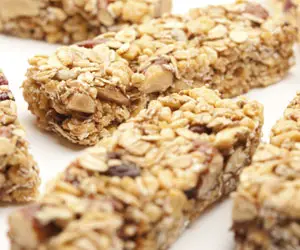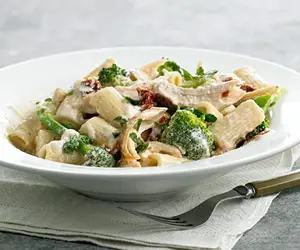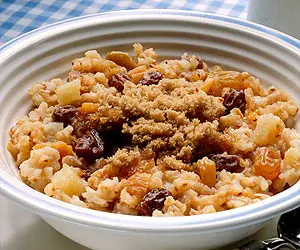Promising nutritional claims and word combinations such as low-fat, sugar-free or cholesterol-free in addition to attractive shape & color of packaging are usually the main reasons for purchase.
While these claims are true and verified (otherwise manufacturer is breaking the law) you should know that if a particular food is sugar-free it usually has high fat content. On the other hand, when food is low-fat it usually contains a lot of sugar. All in all – not good choices.
When something is “taken out” it has to be replaced with something else that still gives food a flavor. It is a fact that when you remove sugar or fat from a particular food it usually becomes tasteless. And people don+t like tasteless food. It just won’t sell.
Here’s a short list of foods that appear healthy and low in calorie, but they’re not.
Foods to avoid while following a diet:
Below is a bit more detailed explanation as to why.
Avoid muesli bars / energy bars
Muesli bars are healthy and practical snacks. You can always have a muesli bar at hand.
 Energy bar is a quick and handy source of energy.
Energy bar is a quick and handy source of energy.
But if you are dieting and want to lose weight you should keep in mind that most of these snacks contain high amount of sugar (up to 30 percent or more).
Of course the label says low sugar but you should be careful about that because low is a relative term. If you want a tasty bar it has to contain sugar. The more sugar it contains the better the taste.
Hidden sugar
If you take a closer look at list of ingredients you can see that sugar is referred to as for example syrup of grape sugar, brown sugar, glucose syrup, honey, barley malt syrup or caramel…
Although such bar only contains 100 to 200 calories on average you actually consumed empty calories that will not make you feel satisfied.
On the contrary, due to high presence of sugar and refined carbohydrates, a desire for food is raised.
Simple sugar causes quick elevation of blood sugar due to its high glycemic-index following by a fast drop of blood sugar. As a result you will feel without energy after a short time.
Muesli bars (and other candy bars) also contain up to 20 percent of fat, often in the form of unhealthy margarine which you should avoid eating when possible.
Last but not least – proteins, a very important nutrient, are mostly not present in such food.
Muesli bars are a great source of energy, when you need it fast. Otherwise avoid such food, especially when on diet.
Salad dressings
Avoid salad dressings. Even the ones that are labelled “light” or “low fat”. Even the ones with the label “fat free” are not healthy. Why? Because if you remove fat from food you need to replace fat with something else. You’ve guessed it – in most cases it is replaced with sugar and starch.
 Salad is a healthy meal. Try not to combine it with pre-made salad dressings.
Salad is a healthy meal. Try not to combine it with pre-made salad dressings.
Suddenly, these dressings are not so “light” anymore, right? They contain a lot of sugar and are pretty caloric.
And besides, moderate consumption of healthy fats is desirable, in fact, it is quite necessary, especially when dieting.
Mediterranean type of diet, for example, contains up to 30 percent of fat (pure virgin olive oil). It has been proven that it is much easier to stick with a diet containing a moderate amount of healthy fats than on a diet that contains almost no, or no fat at all.
You should consume foods that are rich in omega 3 fatty acids. Certain vitamins found in salad can only be used by your body if they are consumed in combination with fat (fat-soluble). For example Vitamin E.
Instead of using pre-made salad dressings you can prepare your own. You can mix yogurt, fresh unprocessed vegetable oil (or better yet, olive oil), vinegar, lemon juice, mustard and herbs.
If you frequently eat in restaurants order a salad without dressing and ask the waiter to bring you olive oil and vinegar instead. Thus, you will avoid the unnecessary sugar and processed fats intake while still enjoying your salad.
Fitness flakes, fitness cereals
Almost every grocery store has a wide choice of cereals. The packaging usually shows models with great and nicely shaped bodies enjoying cereals. Nutritional claims such as “low-fat” and “whole grain” convince us to make a purchase.
 Cereals usually contain a lot of sugar and are as such not a recommended food to consume when dieting.
Cereals usually contain a lot of sugar and are as such not a recommended food to consume when dieting.
Similar to muesli bars cereals also have sugar added in form of glucose-fructose syrup, sweet yoghurt toppings, chocolate chips or chocolate covered fruit.
Check the amount of sugar contained in a box of cereal that you have in the kitchen and you will be surprised.
Although companies selling cereal claim that their product is a wholegrain (wholegrain products have low gylcemic index), the majority of industrially processed cereal have high glycemic index.
Definitely not good for dieting.
Minced (chicken, pork, …) meat
Chicken and turkey meat is low fat that is why it is very often on menu when on low calorie diet, especially because red meat is (often wrongly) claimed to be unhealthy.
You must be aware that processed meat usually contains parts of animals (for example tissue) that are not as healthy and contain more fat. The quality of minced meat is therefore low.
If you want to eat processed products buy yourself a nice piece of meat and mince it yourself.
Fruit yoghurt and low fat yoghurt
Colorful fruit on the cover of yoghurt invites you to eat it for lunch. That’s nice. But how much of actual fruit is in such yoghurt? Not much really.
 Fruit yoghurt is a source of sugar. A lot of sugar. Avoid eating fruit yoghurt or eat only fruit yoghurt with pieces of real fruit.
Fruit yoghurt is a source of sugar. A lot of sugar. Avoid eating fruit yoghurt or eat only fruit yoghurt with pieces of real fruit.
You can easily tell how much sugar a yoghurt contains when reviewing the list of ingredients in the product.
First of all, not real fruit is put in the yoghurt. Different fruit preparations are used instead and the main ingredient of a fruit preparation is glucose-fructose syrup (sugar source).
An average fruit yoghurt (for example strawberry flavoured yoghurt) contains about 0.7 oz (22 grams) of sugar. That’s 4 big spoons of sugar. Do you put 4 big spoons of sugar in your coffee? Probably not. On the other hand 3.5 oz (100 grams) of fresh strawberries contain only 0.1 oz (5 grams) of sugar.
Fruit yoghurt containing low-fat milk (0.5 percent fat or less) may contain up to three times more added sugar than the yoghurt made of 1.6 percent fat milk.
Instead of buying a fruit yoghurt buy a non-fruit yoghurt with 1.6 percent fat and mix it with a fresh apple or banana.









































